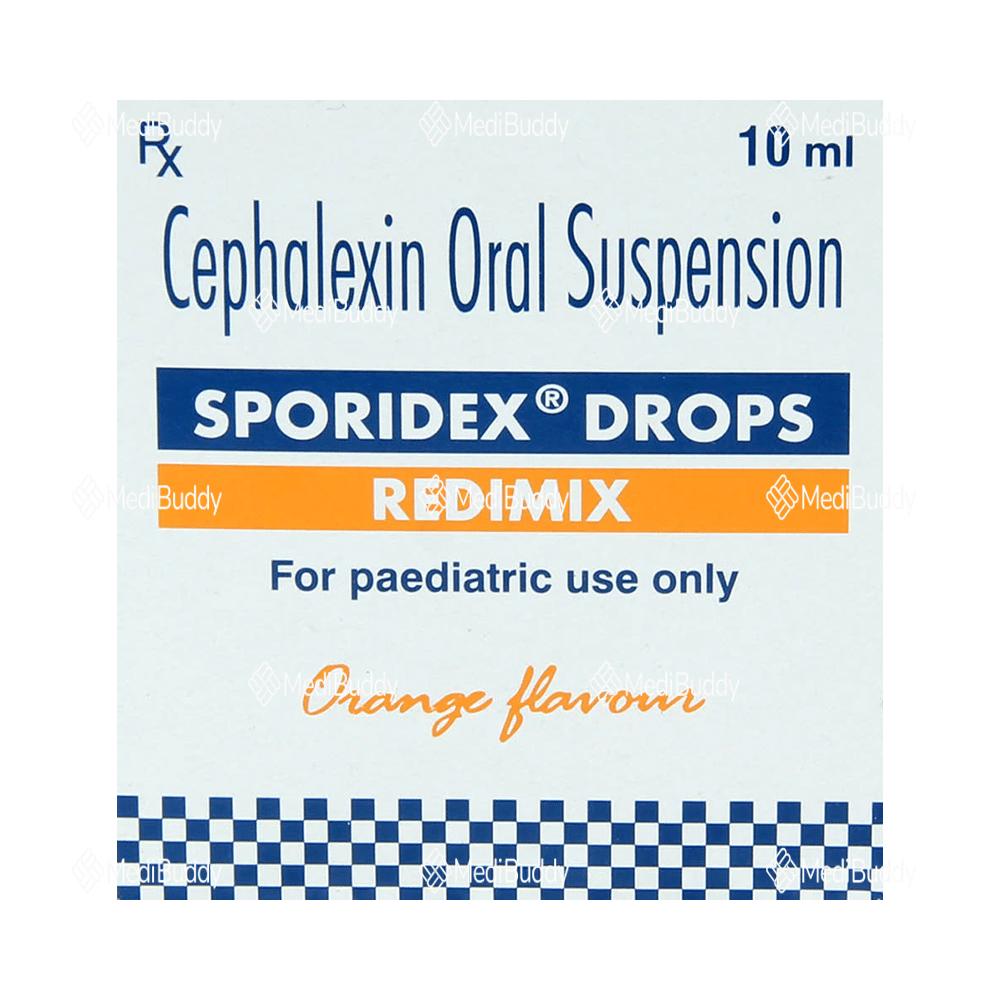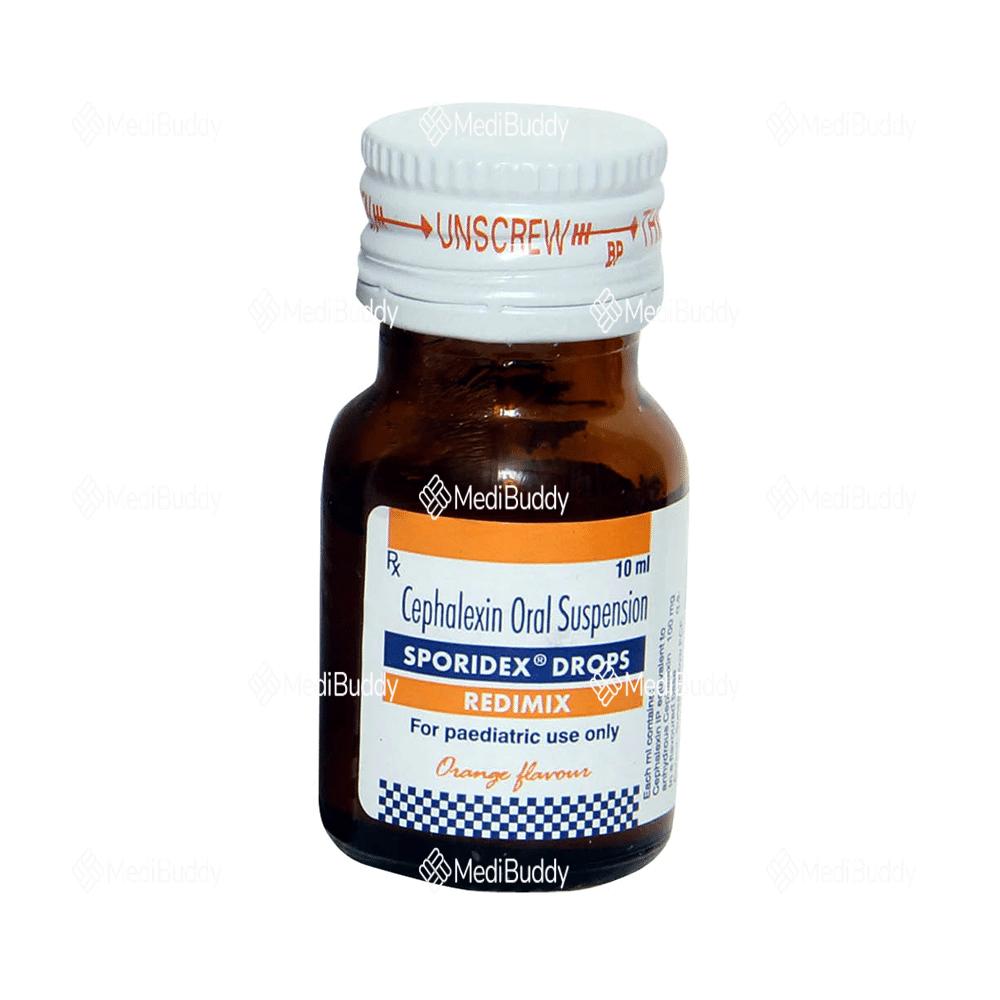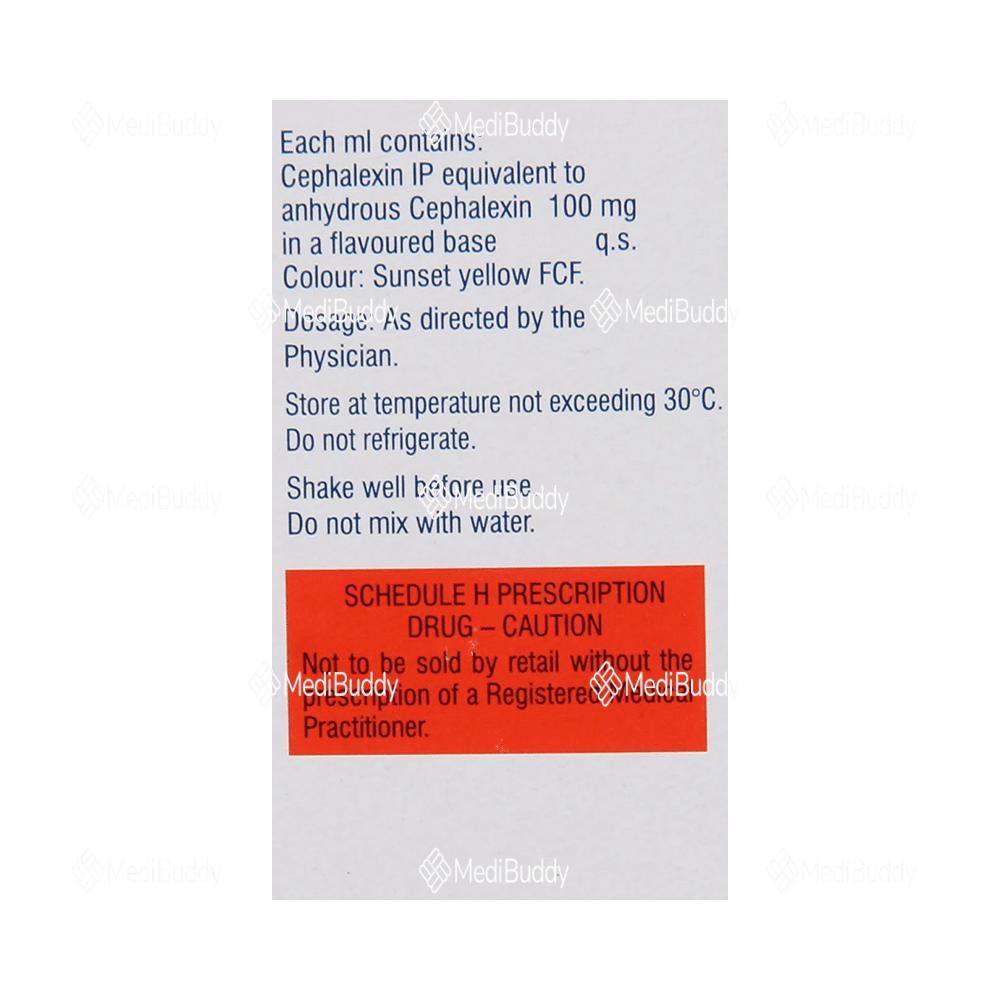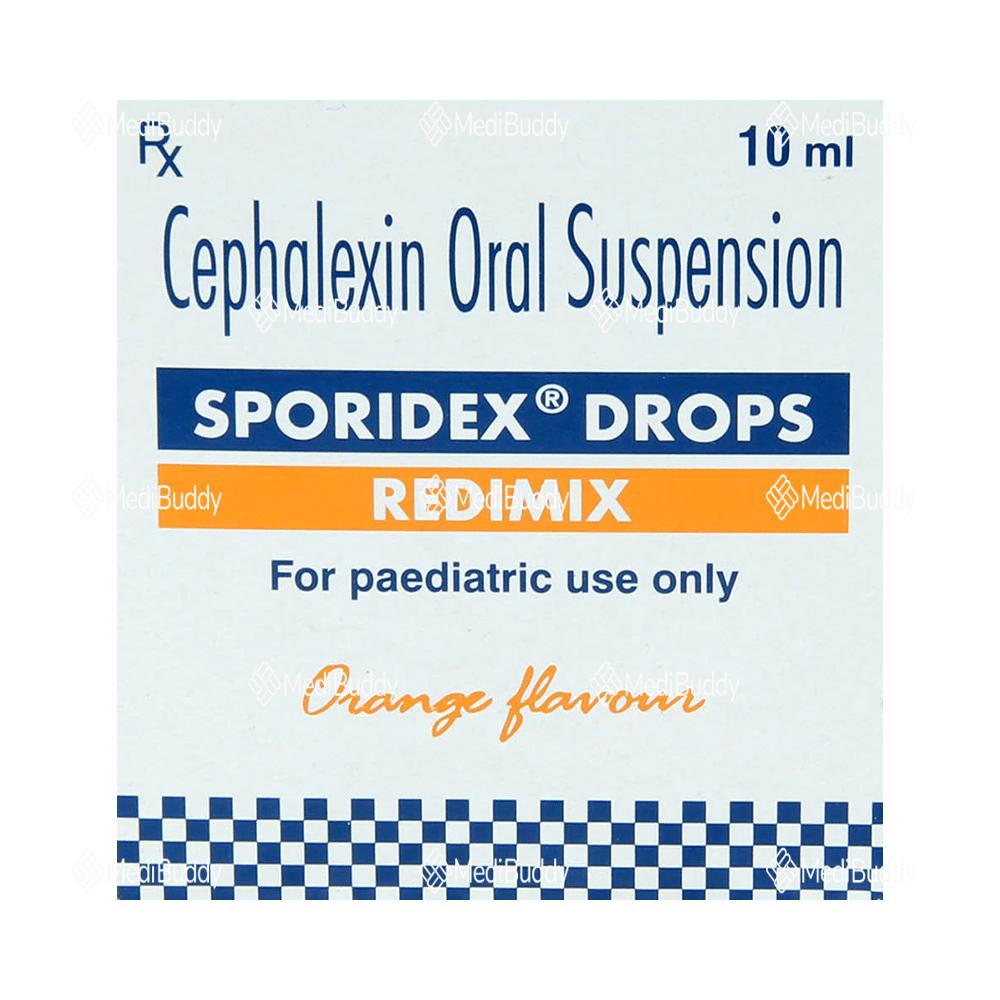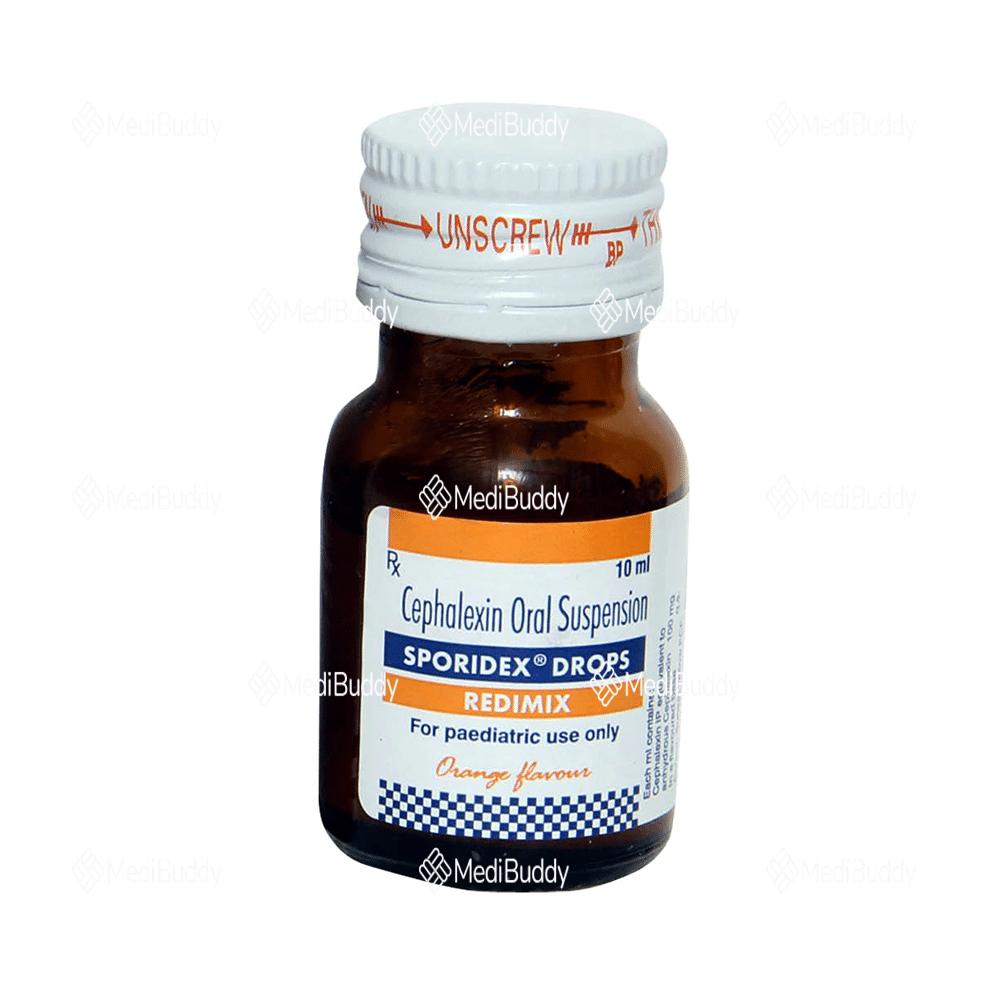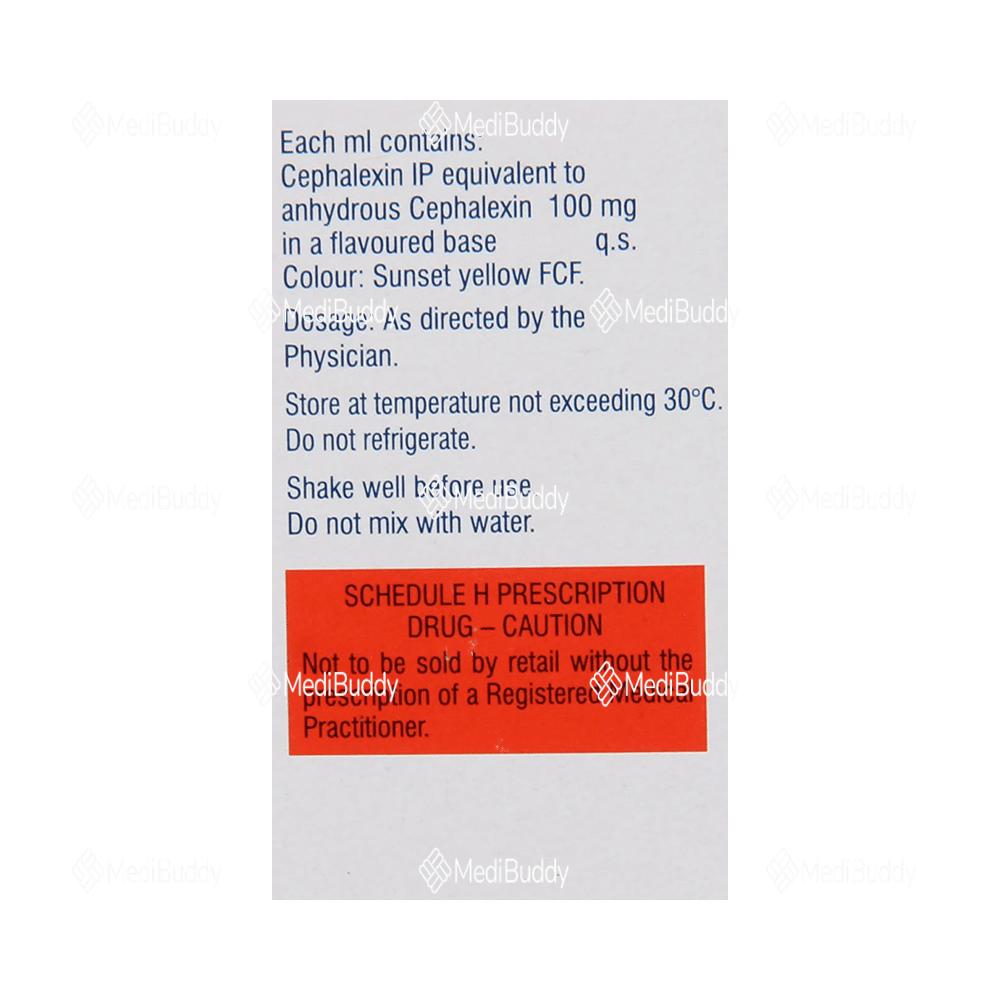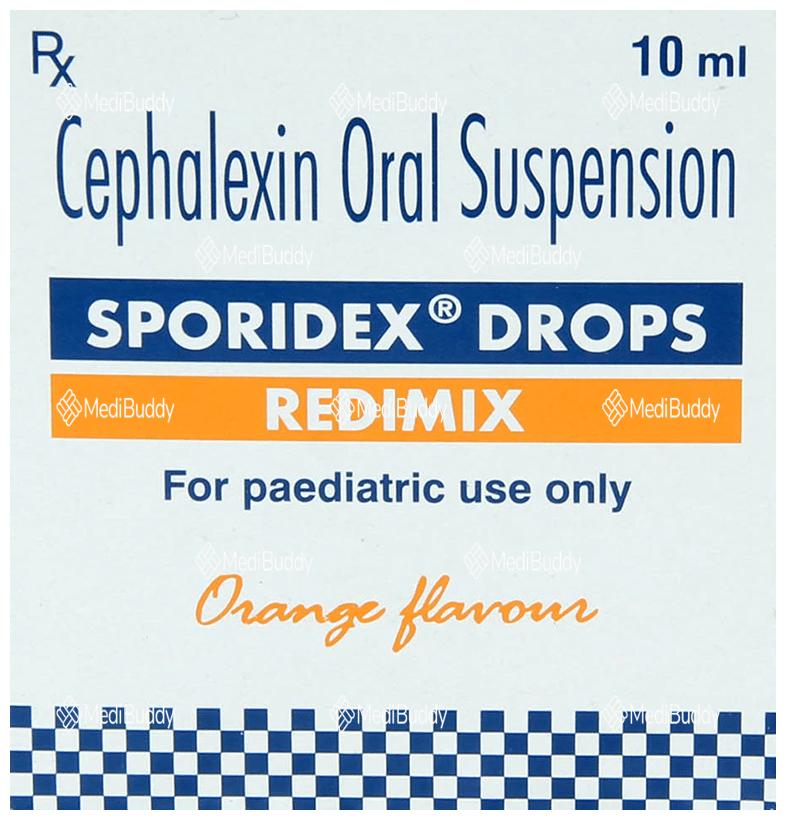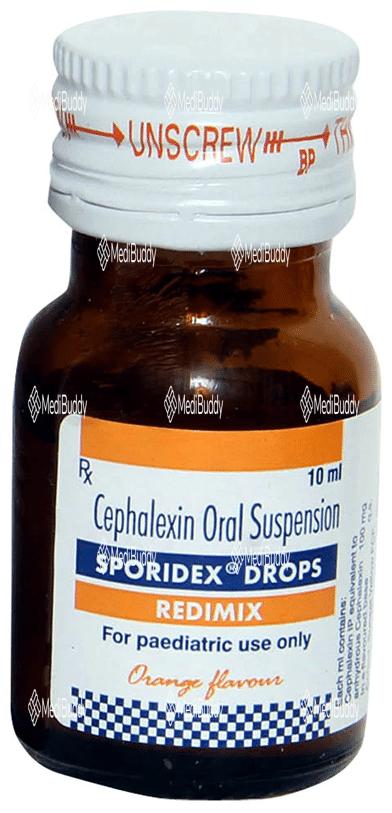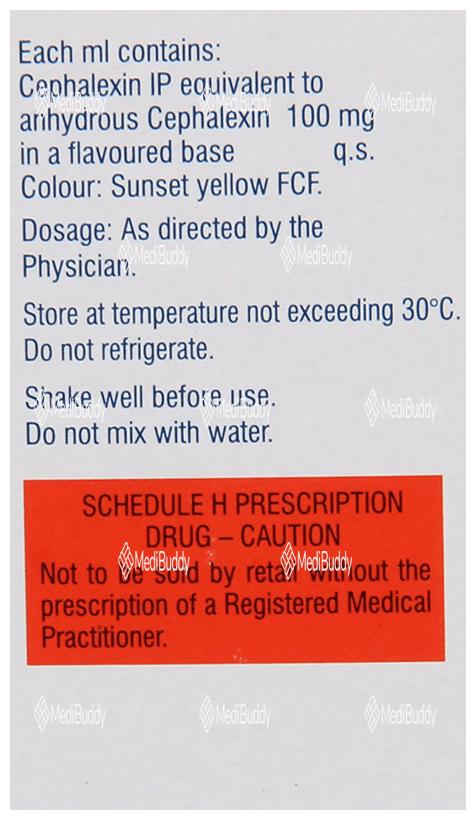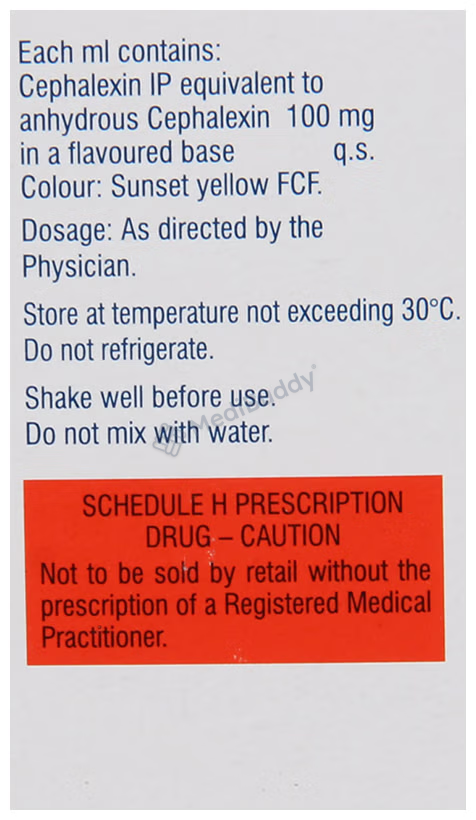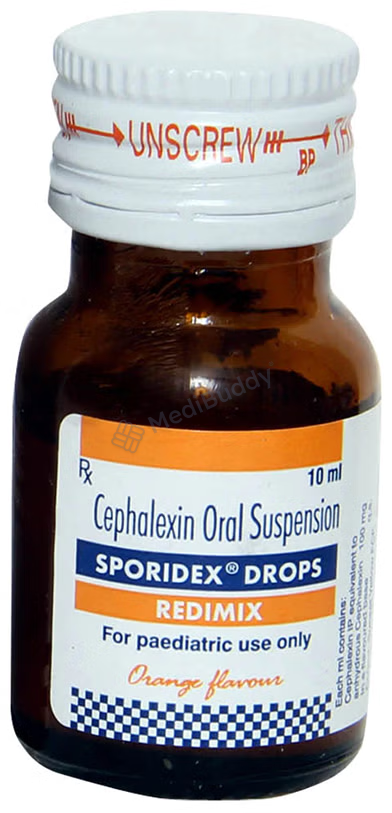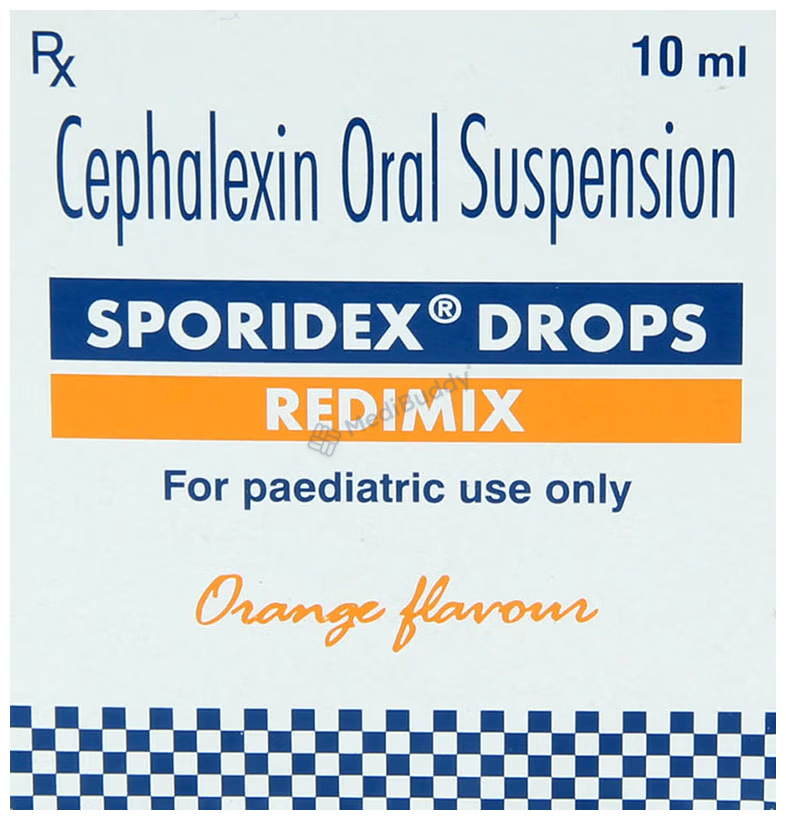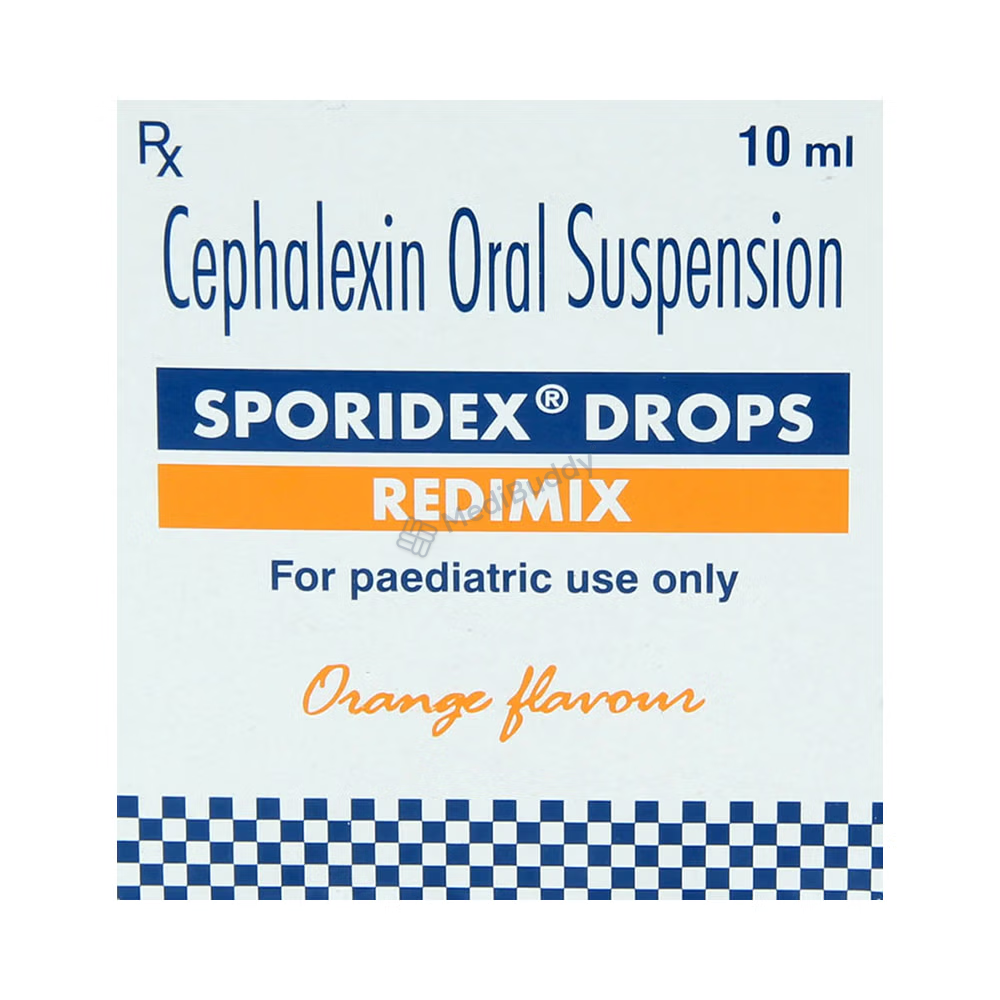Sporidex Redimix Drop Orange
By Sporidex
Rx
10ml Drop in a Packet

Composition
Cefalexin(100mg)

Manufacturer - Sun Pharmaceutical Industries Ltd
Plot no 107/108,Namli block , Ranipool, East Sikkim 737135

Expires on or after
October, 2025
About Sporidex Redimix Drop Orange
Sporidex Redimix Drop Orange is an antibiotic medication primarily used to combat a variety of bacterial infections affecting different parts of the body such as the ear, nose, throat, tonsils, lungs, skin, and urinary tract. It may also serve as a secondary treatment option for urinary tract infections. This oral suspension may be administered with or without food, but if it causes stomach upset, it is advisable to give it along with a meal. The typical dosing regimen involves three administrations daily, tailored to the specific infection and its severity. It is crucial to strictly adhere to the dosage, timing, and administration method as instructed by the prescribing healthcare professional. In cases where a child vomits within 30 minutes of taking the medicine, a repeat dose is recommended. However, avoid administering a double dose if the next scheduled dose is near.
The active ingredient in Sporidex Redimix Drop Orange is a cephalosporin antibiotic known for its effectiveness against various bacterial infections affecting areas like the nose, lungs, ears, bones, joints, skin, urinary tract, prostate gland, and reproductive system. Additionally, it can be used to treat dental infections. Bacterial infections are triggered by harmful bacteria multiplying within or on the body, leading to illness. These pathogenic bacteria produce toxins that can harm tissues and cause sickness. Sporidex Redimix Drop Orange is bactericidal, meaning it works by inhibiting enzymes essential for forming peptidoglycan, a crucial component of bacterial cell walls. This mechanism results in bacterial death, curbing the infection's spread and aiding in its treatment. Notably, Sporidex Redimix Drop Orange is ineffective against viral infections like cold and flu.
The dosage and duration of Sporidex Redimix Drop Orange treatment may vary depending on the individual's condition and the infection's severity. Completing the prescribed course of medication is recommended, even if symptoms improve, to prevent more severe infections and the development of antibiotic resistance. Some common, temporary side effects may include vomiting, diarrhea, nausea, abdominal pain, and skin rash, which typically diminish as the body adjusts to the medication. However, persistent or troubling side effects should be promptly reported to the healthcare provider. Before initiating treatment with Sporidex Redimix Drop Orange, it is essential to disclose the child's complete medical history, including allergies, heart issues, blood disorders, birth defects, lung abnormalities, gastrointestinal problems, skin conditions, and liver or kidney dysfunction. Such information aids in determining the correct dosage and treatment plan for the child's holistic care.
Benefits
Sporidex Redimix Drop Orange is a beneficial antibiotic medicine used in the treatment of bacterial infections. It helps by effectively targeting and eliminating the bacteria responsible for infections in areas such as the throat, ears, urinary tract, skin, and soft tissues. By killing the infection-causing bacteria, this medicine can help alleviate symptoms and improve your overall condition. Typically, you may start feeling better within a few days of taking Sporidex Redimix Drop Orange. However, it is important to complete the full course of treatment as prescribed by your healthcare provider, even if you start to feel better. Abruptly stopping the medication could result in the infection returning and becoming more challenging to treat. Therefore, by following your doctor's instructions and completing the full course of Sporidex Redimix Drop Orange, you can effectively combat bacterial infections and promote a quicker recovery.
How to use the Sporidex Redimix Drop Orange
To use Sporidex Redimix Drop Orange, follow your doctor's instructions on the dose and duration of taking the medicine. Before using, carefully read the directions on the label. Use a marked dropper to measure the correct amount as directed. You can take Sporidex Redimix Drop Orange with or without food, but it is recommended to take it at the same time each day for better results. Make sure to use the medicine only as prescribed by your doctor to ensure its effectiveness.
Uses of Sporidex Redimix Drop Orange
Sporidex Redimix Drop Orange is commonly used for treating bacterial infections. It is beneficial in addressing various types of bacterial infections in the body. This medication works by targeting and eliminating the bacteria responsible for the infection. Sporidex Redimix Drop Orange is effective in fighting against common bacterial infections and helping individuals recover. It is important to follow the prescribed dosage and duration of treatment to ensure the best outcomes when using Sporidex Redimix Drop Orange for bacterial infections.
What conditions Sporidex Redimix Drop Orange treats?
Sporidex Redimix Drop Orange is an antibiotic used to treat bacterial infections such as those affecting the ear, nose, throat, tonsils, lungs, skin, and urinary tract in children. It should be administered as prescribed by the doctor, with or without food. Possible side effects like vomiting, diarrhea, nausea, abdominal pain, and skin rash are usually temporary. Notify the doctor of any persistent or bothersome side effects. Sporidex Redimix Drop Orange effectively eliminates infection-causing bacteria, relieving symptoms within days. Completing the full course is crucial to prevent the infection from returning.
Should you consult a doctor?
Seek medical attention for your child if they experience persistent or bothersome side effects such as vomiting, diarrhea, nausea, abdominal pain, or mild skin rash while taking Sporidex Redimix Drop Orange. Although these side effects are usually temporary and mild, it is important to consult your child's doctor if they continue or worsen over time. Additionally, inform the doctor about any prior medical conditions or allergies your child may have to ensure the correct dosage and treatment plan. If your child vomits within 30 minutes of taking the medication, give the same dose again. Remember not to double the dose if it is nearly time for the next scheduled dose. Be vigilant and attentive to any unusual symptoms or reactions your child may experience and report them promptly to their healthcare provider for appropriate management.
Side effects of Sporidex Redimix Drop Orange
When taking Sporidex Redimix Drop Orange, children may experience mild and temporary side effects that are generally well tolerated. These side effects can include abdominal pain, rash, stomach pain, nausea, indigestion, diarrhea, and vomiting. It is important to note that these effects are usually not serious and tend to lessen as the body gets used to the medication. However, if these side effects persist or become bothersome for your child, it is recommended to consult their doctor for further guidance.
Safety advice

liver
Sporidex Redimix Drop Orange is considered safe for use by patients with liver disease. It is not necessary to adjust the dosage of this medication. It is advisable to consult your child's doctor before administering this medicine to your child if they have a severe form of liver disease.

kidney
Use Sporidex Redimix Drop Orange cautiously in patients with kidney disease. Dosage adjustment may be necessary. Refer to your doctor for guidance.
Consumption warning before consuming Sporidex Redimix Drop Orange
Before giving Sporidex Redimix Drop Orange to your child, it is important to note a few key warnings. This antibiotic medication is commonly used in children to combat various bacterial infections in different areas such as the ear, nose, throat, tonsils, lungs, and skin. It may also serve as a secondary treatment for urinary tract infections. Remember that Sporidex Redimix Drop Orange can be administered with or without food, but if your child experiences stomach upset, it is advisable to give it with a meal. The dosing frequency is typically three times a day, as directed by the physician based on the specific infection's nature and severity.
Should your child vomit within 30 minutes of taking the medicine, provide the same dose again. However, do not double the dose if it's almost time for the next scheduled dose. As with any medication, there may be mild and temporary side effects like vomiting, diarrhea, nausea, abdominal pain, and skin rash. These effects usually diminish as the body adjusts, but if they persist or worsen, consult the doctor promptly. Additionally, disclosing your child's complete medical history to the doctor, including any prior allergies, heart issues, blood disorders, birth defects, lung anomalies, gastrointestinal complications, skin conditions, or liver/kidney abnormalities, is crucial for ensuring the correct dosage and treatment plan.
What if you forgot to take Sporidex Redimix Drop Orange?
If you have missed giving a dose of Sporidex Redimix Drop Orange to your child, and the doctor has not provided a specific dosage instruction, you should give the missed dose as soon as you remember. However, if it is almost time for the next scheduled dose, skip the missed one to avoid giving a double dose. It's essential to follow the dosing schedule exactly as prescribed by the doctor to ensure the effectiveness of the medication. Remember, it's always recommended to consult the doctor if you have any concerns about missed doses or the administration of the medication.
Related lab tests
For monitoring the effects of Sporidex Redimix Drop Orange, your healthcare provider may recommend certain related lab tests. These tests can help in assessing and managing your condition effectively. One important test is the Complete Blood Count (CBC), which provides valuable information about your red blood cells, white blood cells, and platelets. It helps in diagnosing different conditions like anemia, infections, and blood disorders. Another significant test is the Peripheral Smear Examination, which involves looking at a sample of your blood under a microscope to evaluate the shape, size, and number of your blood cells. This test can help in diagnosing conditions such as leukemia, malaria, and other blood disorders. Both these lab tests play a crucial role in understanding your overall health and treatment progress. Be sure to follow your healthcare provider's recommendations regarding these lab tests to ensure proper monitoring and management of your condition.
Additional Information
| Habit Forming | No |
| Chemical Class | Narrow-spectrum {First generation cephalosporins} |
| Therapeutic Class | ANTI INFECTIVES |
| Action Class | Cephalosporins: 1st generation |
FAQs
Disclaimer
The information provided on this website is to the best of our abilities to ensure it is accurate, reliable, and reviewed by a team of professionals. It should not be used to diagnose, prevent, or cure any health problem. The information presented here is not intended to create a doctor-patient relationship or replace a registered medical practitioner's advice, diagnosis, or treatment. The absence or provision of any information or warning regarding any medicine should not be assumed as an implied or explicit assurance of safety or efficacy. We highly recommend consulting your registered medical practitioner for all queries or doubts related to your medical condition. Do not ignore professional medical advice or delay seeking it based on the content encountered on our website. We intend to support, not replace, the doctor-patient relationship.
₹115
Inclusive of all taxes
Content verified by

Dr. Mansi Chaudhari
MBBS - General Medicine
Last update on 01-Oct-2024
